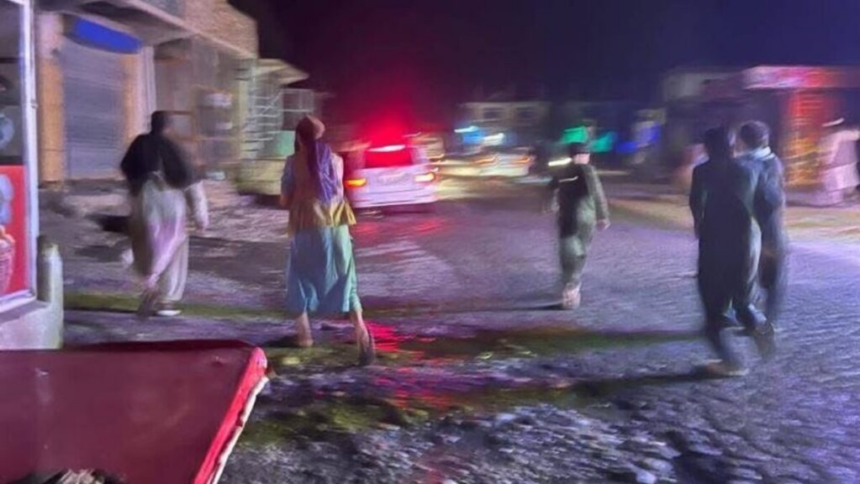RASC News Agency: Heavy clashes have once again erupted between Taliban forces and Pakistani border troops along Afghanistan’s southern frontier, underscoring the growing volatility and mistrust that now defines relations between Kabul’s de facto rulers and Islamabad.
Local sources in Kandahar Province confirmed that early Tuesday morning, October 14, intense gunfire and artillery exchanges broke out along the frontier zones of Sarlat in Khurawak district and parts of Shorabak, lasting for nearly five hours. Residents reported the use of both light and heavy weaponry as the two sides traded fire across the border, sending waves of panic through nearby villages. No independent confirmation of casualties or damages has yet been released.
Neither the Taliban regime in Kabul nor Pakistan’s military authorities have provided any transparent account of the incident a silence that mirrors the habitual lack of accountability from both sides when border tensions spiral out of control.
This latest escalation comes less than 48 hours after a similar armed confrontation erupted on Saturday night, October 11, near Spin Boldak, another volatile crossing point between the two nations. During that clash, Taliban spokesman Zabihullah Mujahid boasted that the group had killed 58 Pakistani soldiers and captured 25 border outposts a claim widely dismissed by Pakistani officials and independent observers as an exaggerated attempt to project military strength.
In response, Pakistan’s military said its counter-offensive had eliminated nearly 200 Taliban fighters, including members of the Tehrik-e-Taliban Pakistan (TTP) an extremist faction that continues to operate freely inside Afghanistan under Taliban protection. The stark contradiction between the Taliban’s victory claims and Pakistan’s counter-statements once again highlights the propaganda-driven nature of Taliban warfare, which thrives on inflated narratives rather than verifiable results.
In a subsequent press briefing held in Kabul, Mujahid himself admitted that nine Taliban fighters had been killed in the recent battle a quiet admission that sharply contrasts the group’s earlier boasts of triumph.
Meanwhile, local residents and security sources reported that on Sunday morning, Pakistani drones targeted Taliban positions in parts of Spin Boldak, striking suspected compounds and border installations. Although the Taliban refrained from confirming the attack, witnesses described visible plumes of smoke rising over the area. The lack of official acknowledgment by the Taliban has deepened public skepticism toward the regime’s claims of control, revealing an administration incapable of defending its own borders despite its militarized posturing.
The continued cross-border violence has amplified tensions between Kabul and Islamabad, pushing their already fragile relationship into a phase of open hostility. What once appeared to be a partnership rooted in strategic calculation has devolved into mutual suspicion and resentment, as both sides trade accusations of harboring and aiding militant groups.
For Pakistan, the Taliban’s failure to curb the movement of Tehrik-e-Taliban Pakistan fighters inside Afghan territory has become a source of national frustration and domestic security concern. For the Taliban, Islamabad’s airstrikes and drone incursions represent a public humiliation, exposing the group’s powerlessness in defending national sovereignty a principle it frequently exploits in its propaganda.
Political and security analysts believe these repeated confrontations expose a crucial fracture in regional geopolitics. The Taliban, once perceived as Islamabad’s ideological proteges, have become a strategic liability, their erratic conduct destabilizing the very borders they claim to secure. As the Taliban tighten their authoritarian grip over Afghanistani civilians, their inability to maintain basic regional diplomacy continues to alienate neighboring powers.
The regime’s failing governance, widespread corruption, and its continued harboring of extremist networks have transformed Afghanistan into a sanctuary for militancy rather than a functioning state. Regional experts warn that unless meaningful dialogue, facilitated by neutral actors such as Saudi Arabia or Qatar, is urgently revived, the deteriorating security landscape could spiral into a broader regional conflict that neither side can afford.
Beyond the politics of border skirmishes lies a deeper crisis one of legitimacy and competence. The Taliban, whose domestic rule is marked by gender apartheid, repression of dissent, and a collapsing economy, increasingly resort to cross-border confrontations as a distraction from their own internal failures. Their escalating hostility toward Pakistan, once their principal patron, is not a demonstration of independence but rather an expression of desperation a regime cornered by isolation and eroding credibility.
In southern Afghanistan, where the scars of conflict run deep, residents say they are paying the highest price for the Taliban’s militarized vanity. “We are caught between two enemies,” said one Kandahar resident in a phone interview. “Pakistan bombs our villages, and the Taliban use us as shields.”
As the Taliban continue to lose ground in the court of public opinion both domestically and internationally their border provocations risk dragging Afghanistan into another cycle of insecurity and regional hostility. What unfolds along the dusty plains of Kandahar today may well define the next chapter of the Taliban’s unraveling rule: a regime incapable of governance, discredited by its own violence, and abandoned even by those who once helped it rise.






